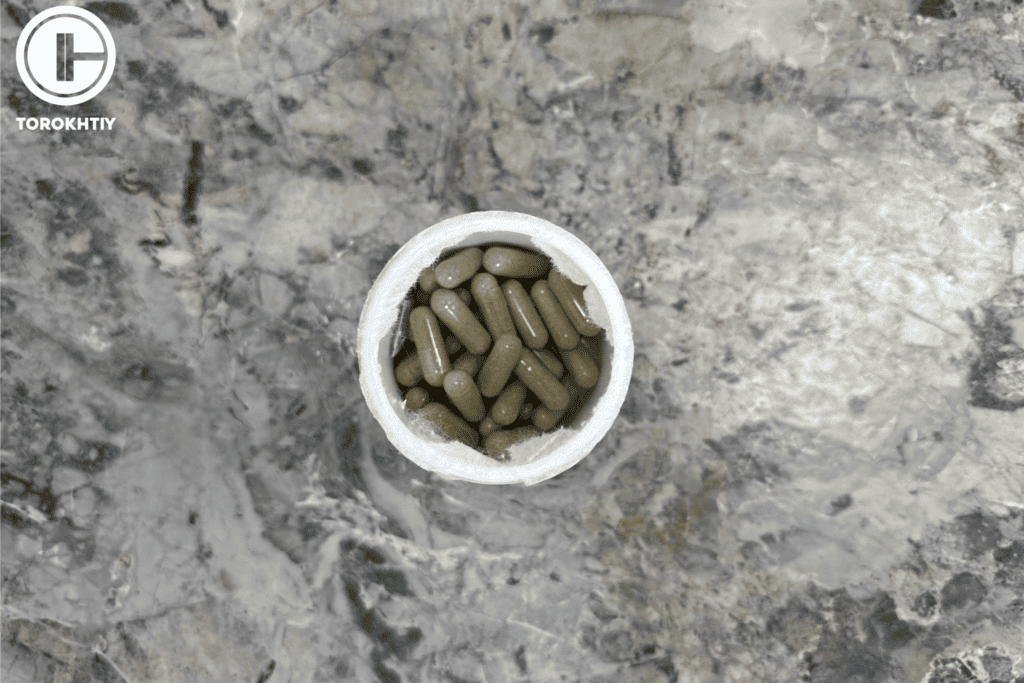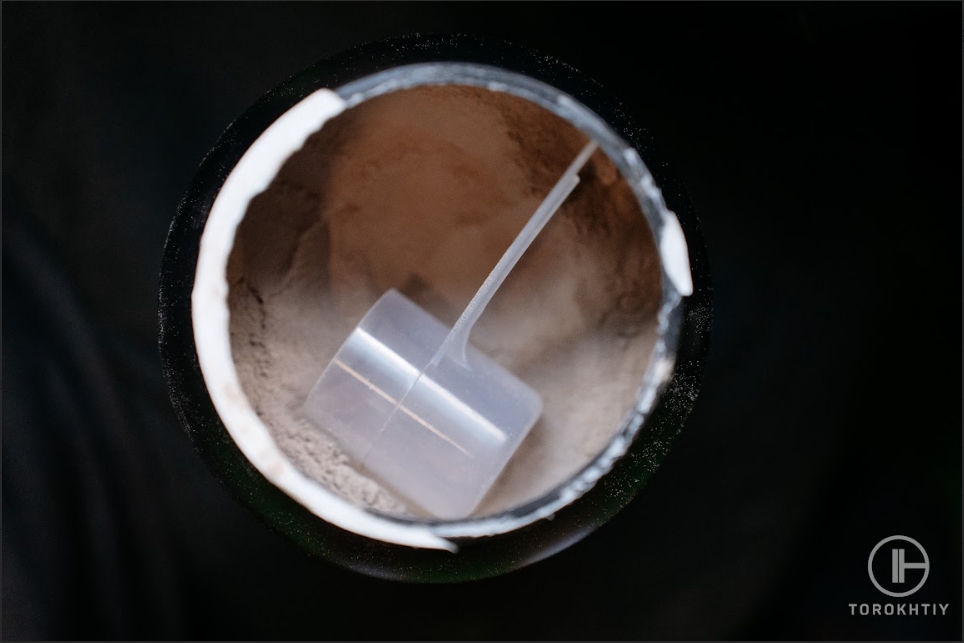Glutamine: an effective supplement or just waste of money?
Author:
Unlock your full potential by engaging with our experts and community! Have questions about your fitness journey or looking for expert advice on weightlifting techniques? Don’t hesitate — leave a comment below and Sergii Putsov will provide a personalized answer and insights to help you reach your goals.
Torokhtiy is reader-supported. Some links are affiliate links, and we may earn a commission at no extra cost to you. See our disclosure page for details.

Before writing this article, I went to the online sports supplements store to read the entire list of promises that are listed in the description for glutamine. There I saw the following statements:
- Accelerates muscle recovery after training
- Maintains a positive nitrogen balance
- Enhances muscle mass and restrains muscle decay
- Protects against weakness, stress, and disease.
Now let’s look at the actual glutamine data.
What is glutamine?
This is conditionally essential and the most common amino acid in the tissues of our body. Most of it is in skeletal muscles. This amino acid performs many biological functions, including regulation of acid-alkali balance, nitrogen transport between tissues. Glutamine also takes part in glucose synthesis.
Glutamine is an extremely important compound for gut health and maintaining the body’s immune function. This is because intestinal cells and immune cells use glutamine rather than glucose as a source of energy.
You may like it:
Skeletal muscles are the main place in which glutamine is synthesized. The glutamine of a healthy person is produced in sufficient quantities without coming from food or supplements.

When glutamine began to be sold as a supplement, it was used primarily to maintain the immune system. But later this supplement became popular with athletes since glutamine is positioned as a means against fatigue. Long and exhausting workouts are also thought to increase the need for this amino acid. But a little later about it.
Glutamine in foods
This is one of the 20 amino acids we get from protein products. In large quantities, glutamine is found in protein food of animal origin: meat, poultry, fish and eggs. There is a lot of glutamine in dairy products, casein, and whey protein.
Some plant sources have a higher percentage of glutamine than protein products of animal origin (corn, rice). However, due to the overall low protein content, they are not the best sources of this amino acid.
In addition to the endogenous synthesis of glutamine, the average person receives about 6 g of this amino acid daily from food. This is on average because the range is about 3-8 grams of glutamine per day. I assume that athletes have higher numbers, given that they eat more protein than the average person.
The amount of glutamine that is absorbed by the intestine and enters the liver does not depend on the source of its admission. Both dietary glutamine (from protein products) and the amino acid in the form of an additive behave the same.
Glutamine, training and muscle growth

Many studies have been conducted on rats, and the results of studies involving people and especially athletes are absolutely not impressive.
In one good experiment, administration of glutamine at a dosage of 900 mg/1 kg dry weight had no significant effect on muscle growth. As a control, the placebo group took maltodextrin. The study involved young people who were engaged in strength training.
If you recalculate such a dose of glutamine for a young guy weighing 75 kg and a percentage of fat of 12%, then you get more than 50 g of glutamine. At the same time, the standard dosage indicated by manufacturers is 5 g. The question arises: if even 50 g does not give anything, is it worth counting on the effect at a dosage 10 times less?
In other studies, the supplement of glutamine to creatine or protein-carbohydrate cocktail (300 mg/1 kg body weight) also had no effect. In general, studies involving healthy people do not confirm that glutamine supplements enhance muscle growth.
During short, high-intensity workouts, the level of glutamine in the blood plasma either increases or does not change. Even with microtrauma, which we receive during eccentric loads. This indicates that an additional intake of glutamine will not benefit athletes who are engaged in power training. After all, the level of this amino acid in the process of power load does not decrease, and therefore the need for it does not increase.
Glutamine and fatigue control
This amino acid can restrain fatigue by several mechanisms:
- directly stimulates glycogen synthesis
- enhances glucose synthesis from non-hydrocarbon sources
- reduces the accumulation of ammonia in skeletal muscles, which can restrain the onset of fatigue.

During endurance training for 2 hours or more, the level of glutamine decreases. Elite athletes with chronic fatigue (for several weeks) and overtraining syndrome show critically low blood glutamine concentrations and increased prevalence of infectious diseases.
However, an additional portion of protein from glutamine-rich products increases the level of this amino acid in the blood and the physical performance of athletes. This raises the question – is there any need for a supplement? Perhaps an additional portion of protein (20-30 g) per day is enough?
In what situations can glutamine be useful?
Under conditions of catabolism, such as injuries, burns, sepsis, or extreme exhaustion of the body, glutamine becomes an essential amino acid. This is due to the fact that during periods of severe diseases this amino acid is much more used in various metabolic processes.
For critically ill (hospitalized) people, this amino acid is of increased importance. During the period of severe diseases and injuries, the need for glutamine increases on the part of the kidneys, cells of the immune system and the intestinal mucosa.
Since skeletal muscles are mainly composed of glutamine, they are at higher risk of catabolism during periods of illness. Adding glutamine to seriously ill people significantly reduces muscle loss.
Conclusion
In a review by the International Society of Sports Nutrition, glutamine is in the last category of efficiency supplements – both for muscle growth and for improving physical performance. It speaks for itself.
If you are a healthy person, do only power training and have balanced nutrition , then the question is immediately removed – glutamine is nothing for you. If you combine strength training with aerobic and are in a state of chronic fatigue or overtraining, it may be worth adding another portion of protein and reducing training volume.
If you are prone to colds, then during exhausting training, taking this supplement in a dosage of 5-10 g per day may reduce the risk of getting sick.
RELATED ARTICLES:
- CAFFEINE & TRAINING
- IS CITRULLINE MALATE WORTH BUYING?
- HOW ALCOHOL AFFECTS RESULTS
- SUPPLEMENTS FOR MASS GROWTH
You might be interested in:
Why Trust Us?
With over 20 years in Olympic weightlifting, strength training, nutrition coaching, and general fitness our team does its best to provide the audience with ultimate support and meet the needs and requirements of advanced athletes and professional lifters, as well as people who strive to open new opportunities and develop their physical capabilities with us.
By trusting the recommendations of our certified experts in coaching, nutrition, and sports training programming, as well as scientific consultants, and physiotherapists, we provide you with thorough, well-considered, and scientifically proven content. All the information given in the articles concerning workout programming, separate exercises, and athletic performance, in general, is based on verified data.
The product testing process is described in more detail here.
Author: Sergii Putsov
Head of Sport Science, PhD
Best Results: Snatch – 165 kg,
C&J – 200 kg
Sergii Putsov, Ph.D., is a former professional weightlifter and National team member, achieving multiple medals in the 94 kg weight category at national competitions. With a Master’s degree in “Olympic & Professional Sport Training” and a Sport Science Ph.D. from the International Olympic Academy, Greece, Sergii now leads as the Head of Sport Science. He specializes in designing training programs, writing insightful blog articles, providing live commentary at international weightlifting events, and conducting educational seminars worldwide alongside Olympic weightlifting expert Oleksiy Torokhtiy.




Still have questions after reading our article? Unlock your full potential by engaging with our experts and community! Don’t hesitate — leave a comment below and Sergii Putsov will provide a personalized answer and insights to help you reach your goals.